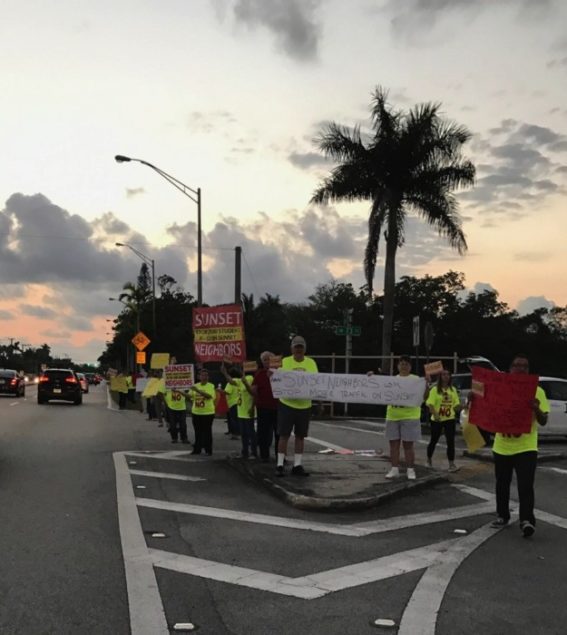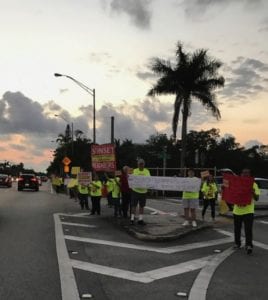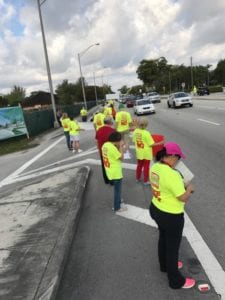

A hearing to determine the fate of a proposed charter school on Sunset Drive and 73rd Avenue is set to take place at 9 a.m. on Thursday, April 20 at the Miami-Dade County Commission Chambers, 111 NW 1st St.
Somerset Academy, a charter school with several locations throughout South Florida, hopes to overturn a 1997 zoning resolution limiting the usage of a 19-acre parcel of land owned by Christ Journey Church. If passed, the variance will allow for the construction of a K-12 school for 2,500 students—a titanic shift from present zoning, which prohibits building any school structure on the property other than a day nursery serving less than 100 children.
Supporters and opponents of the school, tentatively named Somerset Sunset, have voiced their opinions in public forums and media for more than a year. Those in favor of the school point to high overall student performance ratings, endorsements from Governor Rick Scott, studies showing an increase in the property values of surrounding homes, and an independent audit by Coral Gables accounting firm HLB Gravier, LLP, which indicates that an estimated 5,000 nearby students currently on high school waiting lists would benefit from a local charter option.
“If you look at Miami-Dade specifically, you’ll see that public schools have tweaked their offerings after charter schools came into the picture,” said Lynn Norman-Teck, executive director of the Florida Charter School Alliance. “Parents have become savvy education consumers, and there are families who are interested in a high-quality alternative in a charter school. I compare it to the university system; there is competition, and it’s driven by what parents and students want.”
Hundreds of residents, many of them parents, remain unconvinced that what their neighborhood needs is another charter school—a public school run by a private company. They argue that there are more than a dozen underutilized public, private and charter schools already in the area. A super-charter like Somerset Sunset, they say, will only siphon off further resources from an already emaciated public school system.
Florida has approximately 4,270 public schools, which serve about 2.7 million children. Of those, 650 are charter schools that host roughly 250,000 students. Amid the new political climate in Washington, pro-charter legislation is pouring into states. In Florida, the controversial HB 5105 “schools of hope” bill recently passed in the House. Upon passage in the Senate, it will approve spending $200 million in 2017-18 to incentivize charter schools to open in the state. Another measure, SB 376, which just passed in both state legislative chambers, could result in school districts allotting construction funds from property tax revenue to charters.
“To me and a lot of people, it’s taxation without representation,” said Mary Faraldo, executive director of Sunset Neighbors, a local community advisory council. “Our tax dollars are supposed to fund a public school system where you have the highest possible level of education and standards available to provide an even playing field to all Americans. That’s not what’s happening.”
There also remains the question of whether Sunset Drive can handle such a massive influx of daily commuters—an estimated 25 percent increase in traffic. At the rate of 1.5 students per car, minus approximately 300 who commute by bus, about 1,467 additional vehicles will visit the area twice daily. The result, a significant hike in road congestion, could potentially choke the thoroughfare into gridlock.

“Ambulances with critical patients will not be able to jump the curb and drive the wrong way on Sunset because the wrong way will now be clogged also, with parents taking their kids to that school,” said South Miami Vice Mayor Robert Welsh, who joined Mayor Philip Stoddard and three members of the city commission in advising county commissioners to reject the variance. “It’s a huge increase in traffic. The result is that patients will die in ambulances on their way to two hospitals.”
Norman-Teck says Somerset has already addressed the traffic problem with a carpool program, staggered drop-off and pick-up schedule and an internal design that, if it works as intended, will contain school-related commuters in an on-campus queue.
“There is a lot of planning that goes into this, and they take great pains to meet requirements by the county,” she said. “This is an organization with a 20-year history in Florida of being a good neighbor, not just with traffic flow but providing a high quality of education. They take the drop-off and pick-up and the impact that occurs very seriously.”
Both sides of the debate look forward to having their voices heard at Thursday’s hearing, an impassioned showdown of opposing ideals that may decide the neighborhood’s foreseeable future. And they are treating it with appropriate seriousness. Though proceedings aren’t scheduled to begin until 9 a.m., each group’s most passionate members will arrive far earlier, leaving nothing to chance.
“They’re going to pack the house, and what we’re afraid of is that they’re going to overwhelm things,” said Faraldo. “I know that they’re telling parents to get there at 6 a.m. They’re going to mobilize their entire network and get as many people as they can there, where the chamber is going to have to close off to residents. Now, myself and a group of others, we’re planning on getting there at five. I’m about to get to a point where I’m just going to sleep there, but not everybody can do that.”






Comments are closed.